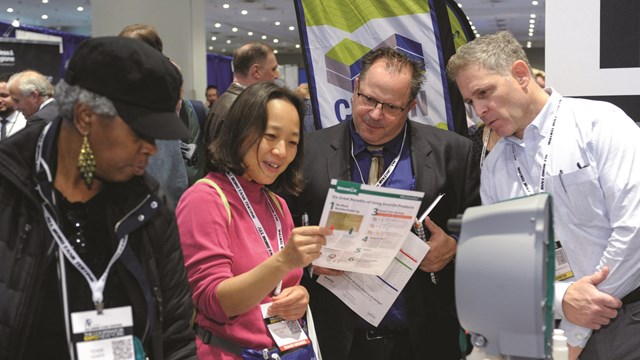
A condominium or homeowners association is the cornerstone of a building community. The condo or HOA maintains order and continuity by preserving architectural integrity, maintaining the common elements, protecting property values, and often providing for recreation and/or entertainment for the community. Board responsibilities may run the gamut from basic maintenance to sophisticated special services. To be effective a condo or HOA needs a strong board of directors or managers who, individually and collectively, understand the role and mission of the association. Operating a condo or HOA involves many of the same responsibilities as any other business, although board members are volunteers and generally serve without compensation.
While some board members may have pertinent experiences from their personal lives—accountants, attorneys, brokers, and managers—most are only armed with a desire to serve their building communities. A newly elected board member will need solid instruction and training to fully understand their role and fiduciary duties. Serving as a board member can be a valuable service and a rewarding experience, but like any other position, proper training and instruction is a must. So who performs the training, and when and where do the instructions take place? There is no one simple answer, but there are several excellent options for motivated boards and board members.
Building an Informed Board
Currently, there are no federal laws in place that require any form of training for condo or co-op board members, and thus states are free to implement legislation as they see fit. According to Joseph W. Scharnak, an attorney with the law firm of Arnstein & Lehr in Chicago, effective July 1, 2016, Illinois will implement an Ombudsperson Act, which will eventually require an ombudsman to offer training, educational materials, and courses for board members. But, as Scharnak notes, these are all optional for board members on a purely informational basis. Boards will still be left to their own volition in regard to pursuing continued education—it will just be more readily available. That said, most experts in the field recommend that board members who want to perform their duties in an effective fashion seek out some form of higher learning. Community association managers in Illinois are required to be licensed but no formal certification is presently required for board members.
The Illinois chapter of Community Associations Institute (CAI-Illinois), however, has started a program to train new board members. This program called Dedicated Community Association Leaders (DCAL) is for community association leaders (board members and homeowners). It offers education, in a classroom setting, to ensure current and future association leaders have the tools necessary to run their associations. To view upcoming DCAL courses, visit www.cai-illinois.org.
Courses include: Introduction to Governing Your Community; Meetings & Elections; Fair Practices in your Community Association; Rules & Regulations; Insurance & Risk Management; Understanding Financials, Budget, Reserves & Reports and the ABC Essentials of Community Association Management. Participants receive a certificate upon completion, and to stay current must renew the DCAL recognition on a yearly basis.
New York-based manager Steven Greenbaum, a 35-year veteran in the industry, believes in something he calls “succession planning” which is a way to identify good candidates for future board positions. Greenbaum looks for interested and/or involved residents who may or may not be serving on a committee. He invites those individuals to sit in on a board meeting and observe the board in action. The visitor can see the nuances and timing of an actual meeting, and observe which board positions might be a good fit for their talents and interests. Greenbaum may suggest that the individual serve as an assistant or intern. During this phase, a prospective board member can observe and participate in board functions such as reading, presenting and understanding a report. Additionally, Greenbaum supplies and reviews two years-worth of minutes for assistants and/or new board members.
Another way to ensure that qualified candidates assume those positions being vacated by veterans is via staggered board terms. As Scharnak explains, this type of succession is incorporated into the bylaws of many associations, and requires that only a handful of board seats are put up for re-election each year. This guarantees that there’s always some continuity on the board, thus allowing existing board members to help the new class get up to speed. An association without this type of plan in place can incorporate one via amending its bylaws.
Raymond Dickey is president of New York-based Brainerd Communications and involved with the Community Associations Institute (CAI) as the publisher of AssociationHelpNow™. He too believes in a proactive approach to board member development. “If you know someone who is interested in running for a board position, include him or her as much as possible in board activities prior to being elected into their position,” he says. “This way, when and if that person is elected, he or she can hit the ground running. Also nominate potential board members from those who are regularly at meetings. These people already know a great deal about current issues in the building or association.”
Dan Wurtzel, president of management firm FirstService Residential New York (FirstService is the largest property management company in North America, with offices throughout the Chicagoland area), believes that some of the responsibility for educating new board members might lie with the manager themselves. “It is in the best interest of all parties to bring new members up to speed as quickly as possible so that they can be effective contributors,” he says.
His own firm does that by preparing a Board Member Resource Guide, detailing the responsibilities and fiduciary duty of new board members.
Greg Carlson, a property manager and the president of the National Association of Housing Cooperatives (NAHC), does not mince words when it comes to educating boards; “No training is not acceptable.” He acknowledges it takes some time for a new member to get up to speed, and the learning curve can bog down a meeting when new members frequently ask for clarity and explanations. That’s where Illinois’ new requirements for training, while not mandatory, can help.
Utilizing Outside Tools
Other pros also make it their mission to prepare new and returning board members for the duties and challenges of running a successful, solvent community. In his role with the NAHC, Carlson oversees annual conferences nationwide for board training and is involved in preparing videos on board training. Additionally, he provides a six-hour course for boards motivated to improve their knowledge and performance. “I visit the building community, obtain their documents, and teach a professional training for the board,” he says.
At a local level, Carlson encourages the use of various organizational website for information on classes, trade shows and events. “The Cooperator's annual Expo offers several educational seminars, as well as opportunities to meet with vendors and industry professionals.” Carlson also recommends monthly trade publications like The Chicagoland Cooperator for regular reading by all board members.
Greenbaum agrees on utilizing any and all local opportunities for board education, “An informed board is a good board,” he says, echoing Carlson. He also suggests that board members attend The Cooperator Expos: “They're one-day events, a couple of times a year, and well worth the time,” he says. The Cooperator Expos in Chicagoland will take place in the spring, Wednesday, May 18, 2016 in Rosemont at the Donald E. Stephens Convention Center, and in the fall on Tuesday, November 15, 2016 at the Navy Pier Convention Center.
For his part, Dickey encourages new board members to participate in CAI chapter events, and to network with others in the same volunteer board positions, as well as any and all industry professionals who currently work with—or might be of future use to—their building or association. “There are a great many professionals, including engineers, attorneys, bankers insurance specialist, and others who focus solely on the co-op, condominium, and HOA industry,” he explains. “The information made available by these folks is invaluable to new and current board members.” CAI Illinois, for example, regularly provides board training and management seminars, and holds its own conference and expo in February.
Other organizations Dickey recommends include the Building Owners & Managers Association (BOMA), and the Institute of Real Estate Management (IREM), which has its own Chicago chapter as well.
All the Moving Pieces
Scharnak recommends that boards engage their legal counsel to provide a new member orientation at the beginning of each new term, or whenever the sitting members deem it beneficial.
And Dickey offers one last piece of advice for all board members: “Remember that this industry is constantly changing. Laws change, new obstacles come up, such as ways associations deal with Internet security or recent powerful storms. A standardized orientation is great, but the pursuit of knowledge should never stop.”
Ann Childers is a freelance writer and a frequent contributor to The Chicagoland Cooperator. Staff writer Michael Odenthal contributed to this article.
Traits of a Successful Board Member
1. Understand the mission & grow beyond it
Make sure you know the condo owners association’s mission before taking up any responsibility. An active member must be equipped and educated on the fundamentals of the association. What are the rules for guests parking? When were the roofs last fixed? Does anything need to be improved? Learn why certain policies are established, so that no confusion ensues.
Once you know the mission, use your other life experiences to build a stronger association. In other words—bring something fresh to the table that nobody else has thought to do.
You may turn into the condo association's new superhero but remember, it’s also important to not go far off track from the original goal. Growth is necessary, but not to the point where you’ll lose sight of the board’s mission.
2. Learn the 3 P’s
Be prepared. Be punctual. Be passionate.
3. Use your network
Having a network outside of the condo owners association holds many possibilities. Do you know a vendor in another industry that will be helpful to you in the future, perhaps a landscaper, repair person, or a commercial cleaning business? Having a wide range of resources to draw from can open up new doors for you and fellow condo owners.
4. Build new relationships
This tip ties in with the last. If you’re networking with people outside of the HOA make an attempt to get to know your peers and neighbors as well. You can socialize with fellow residents without overstepping any boundaries.
5. Foster your independence
This is key but can also be difficult when working with a group. There may be times when the majority of your peers agree on something that you don’t feel is right or true to the association. Stand up for your beliefs but be respectful of others.
Source: Evercondo.com









Leave a Comment